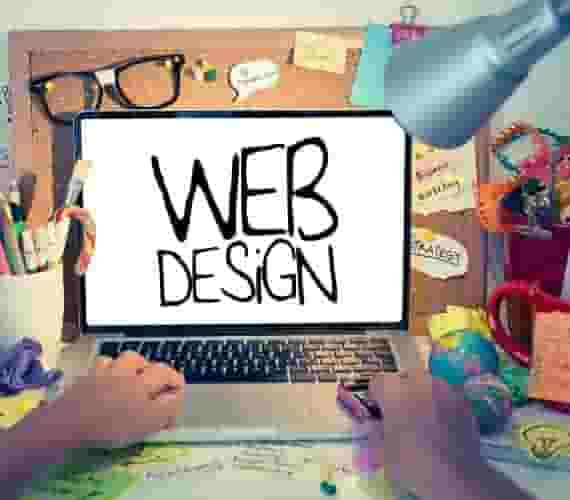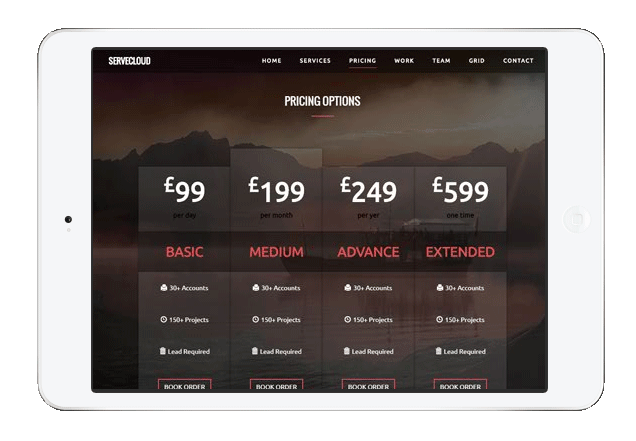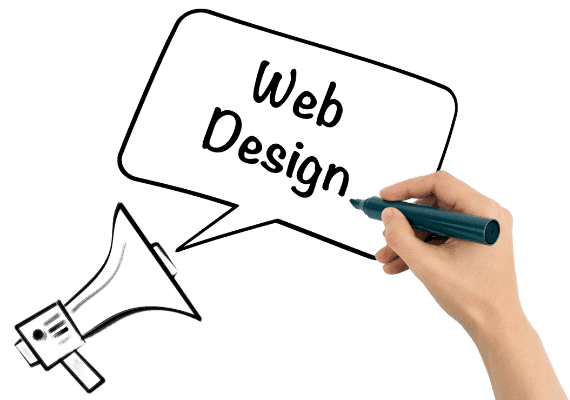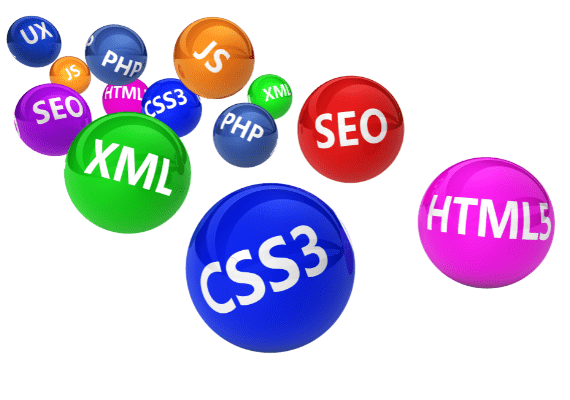Lots of people can build websites today to the point where the market is almost saturated but here this! If your website is not done with SEO (search engine optimisation) in mind then its like having a shop built in the desert, it doesn't matter how good it looks there are no roads to it and no one is going to walk past it. Thats what sets us apart from other website designers and web design companies, if your website gets no traffic you get no money end of!
Do you own your own business and want to make sure that your website will help you to capture and retain your customer base? The answer to your prayers is high-quality web design. Your website is the online face of your business so making sure that it inspires trust in any users that visit is key to helping your business to grow.

Put simply, web design is all of the design elements associated with the user experience. This includes ensuring that the website is easy and intuitive to use, that it is aesthetically pleasing, that its branding is consistent, and that there aren't any distractions or frustration points that could turn users away. Good web design will also help to drive website traffic to your business so that you can be found in the first place.
It used to be that web design was focused entirely on how the website looks on a desktop computer but nowadays, websites that look good on mobile, tablet, and web apps are just (if not more important). Interactive design elements and user interface and functionality are also key to creating a website that has a high-quality user experience.

If you don't have the technical skills needed to create your own website, you have two different options. You can hire a web designer to build your website for you or you can use content management systems/website builders that allow you to build websites without any previous experience. The internet has changed in recent years with straight coding becoming less important than the ability to use sophisticated tools to build sites with the features and elements that are needed.
Web designers don't just know the programming language to physically build your website. They are also highly skilled in the planning, conceptualisation, and graphical elements of web design. Your web designer may help you to develop your web design from scratch, and even help you to create a style guide to make your branding consistent.
A web designer will meet you and ask you a few questions about your business, the purpose of your website, who your target audience is, and more. They will then work with you to plan the web design that will most suit your business needs and bring it to life.
They will be able to design and build websites using platforms like Photoshop and Dreamweaver, and they are often also able to code websites directly using HTML and cascading style sheets (CSS), although these are starting to fall out of favour.
Rather than starting off with a blank page, content management systems (or website builders) allow non-developers to build their own website through the use of basic layout templates, drag and drop web design features and pre-designed elements that you can incorporate into your website.
The benefit of using a content management system is that it allows you to build your website quickly and without the need to work with a web designer or have to learn web design from scratch. On the other hand, you have far less control over customisation. The templates tend to be hard-coded so can't be modified and you have no control over page speed. They can also make it difficult to optimise your search engine optimisation (SEO), which is what allows you to pop up in search engines in the first place.
It can be easy to think that as long as your website has all of the important information for your business, such as services, products, a valid email address, etc, that should be enough. But your web design and how easy and simple it is to navigate your site is key to keeping visitors hanging around.
A good web design creates trust in your visitors and without trust, they will quickly click away and look for a competitor. Confusing, cluttered, and difficult to navigate websites are enough to make a visitor decide to move on to someone else. That first impression is made in seconds and you may not get a second chance to impress them.
Web design is also important for creating brand consistency. You can use colour profiles, different styles, fonts, and visuals to create a design that is consistent enough for you to have brand recognition. Without this, it can be much more difficult for customers to be able to pick you out of the crowd.
You can also use your web design elements to influence how search engines index your site. This is often achieved by making the code SEO-friendly (for example, by using HTML tags) and it is key for your customers to be able to find you in the first place. Only 25% of users click through to the second page of their search engine results, so finding a way to drive your website further up the rankings is an important part of making your brand visible.
For many types of websites, you will want to incorporate interactive elements that work as they should and, in some cases, these can be quite sophisticated. For example, if you are creating a shopping website, visitors need to have the ability to put items in their basket, pay at the checkout via their bank, or connect to services like PayPal or Klarna directly from your site. All of these different steps need to work perfectly if you want to complete the sale.
In other words, should never underestimate the importance of web design when it comes to building your business. So many people in this day and age use the internet to find the businesses and companies that they want to use, the people they want to interact with, the tools they want to use, and so much more. People need to be able to find and access your website easily if you want to be able to increase your reach and develop the relationship with clients and customers that you need to be successful.
These are the elements of your site that your visitors can see or interact with. These elements are important because they are a big part of determining the user experience of your website.
This can include elements such as web copy, the colour scheme and layout, the spacing, and the font. It can also include more dynamic visual elements such as images and videos.
The key to getting the video elements part of your web design right is to think about how aesthetically pleasing. Breaking up walls of text with images and videos is a great idea, for example, but having the site too cluttered with these elements can feel messy and unprofessional. A consistent colour scheme, layout, and font will help users to build trust in your brand as they navigate your website. And having good copy will help them to feel safe that you know exactly what you're doing.
One of the most important web design elements is navigation. You need to make it as easy and intuitive as possible for a visitor to navigate your site or they will quickly get frustrated and move on to somebody else.
Your navigation system should be entirely self-explanatory and easy to find. For example, your drop-down menu should be quick to access and it should be easy for your visitor to find the part of the site they want to get to. Call to action (CTA) buttons (e.g. "buy now") are also an important element of navigation and these should pop out from the background in a clear way, for example by using differences in font size or colour.
Have you ever loaded up a website and found that it looked completely wrong, with elements out of place and some of the site not fitting on your screen properly? This is something that it is vital to avoid when you are designing your own website because it will make your visitors turn away very quickly.
This was never an issue when websites were solely used on desktop computers but, with the rise of smartphones and tablets, as well as different browsers such as Internet Explorer, Google Chrome, Safari, etc, there is a large amount of variability when it comes to screen size. So while the way the pages were displayed used to be fixed by pixels, new solutions have had to be developed to take into account the different ways that users now view websites.
A website with this type of design uses flexible grid layouts that change in real-time depending on the screen size that is being used to view the website. It achieves this by basing the layout on the percentage of the screen that key website elements need to take up, with the rest of the layout being flexible and changing while retaining the percentage of the key elements.
Responsive design sites can take more time to design than other options but you also don't need to worry about how your site's pages will react to new screen sizes.
Rather than the website layout changing in real-time depending on the screen it is being viewed on, adaptive design websites have pre-designed layouts that correspond to particular screen sizes. This can either be based on the device type that is being used (which can be read from the HTTP request) or it can be based on the browser size (using a CSS feature called media queries).
Adaptive design elements can be quick and easy to design but new versions for the pages needed to be created every time a new screen size is in development.
There are pluses and minuses to each design solution, and there are some website builders that allow you to use a mixture of both responsive and adaptive which can give you the best of both worlds.
UX stands for "user experience" and UX designers differ from web designers in a few different ways, although there is a lot of overlap between the two. Some UX designers don't build the actual website as a web designer would. Instead, their skills are focused on the design elements that are found behind the scenes.
UX design is all about understanding how users experience and feel about the web design their encounter. It can include aspects of graphic design and static elements, as well as functional and interactive parts of a website.
UX designers are experts in human psychology and behaviour when it is applied to how people interact and feel, and think about products, including websites. And their insights can be key to implementing a UX design for your website that will leave your visitors feeling engaged and trustful. We have already covered some aspects of UX design, and it does overlap with website design in general, but it has the potential to take it to a slightly deeper level.
For example, when it comes to loading times, web developers/designers will be tasked with understanding why the website design is causing the issue and will work on a way to fix it, whereas someone focused on UX design will be thinking about how the slow loading times will influence user behaviour (e.g. by leaving).
Many web designers will also be trained in UX design but on larger projects, the two types of designers may fill separate roles. If you are creating a smaller website, you may not need a team that includes both UX designers and web designers for your purposes. In these cases, finding a web designer that has a deep understanding of UX design can be very useful.
If you want to use a website builder to build your website, you can choose one that uses the type of website technology that you think would work best for you. Some of these builders require technical skills so that they are best used by a web designer but some are simple enough for a person without any previous website design experience to use.
For example, Wix uses an adaptive website design technology that can be used by complete beginners to drag and drop their website design. PageCloud also uses an adaptive design but does allow for more customisation that can be utilised by a web designer.
Responsive website builders, like Squarespace, are more difficult to customise without the right technical skills just because of the nature of the responsive technology. So it is often better to work with a web designer if you want to customise your website using these tools.
If you are looking to build an eCommerce platform, there are specific website builders like Shopify that are designed with these types of platforms in mind. The vast majority of websites based around shopping have very different interaction design elements compared to other websites like blogs, or services websites. So using a website builder that has these elements ready to incorporate into your site development can make the web design work much less time-consuming.

As with any other situation where you are looking to work with someone to bring your creation to life, finding the right designer to help you is key to bringing your idea to life. Web designers will often have a portfolio that you can look through to see some of their previous work with other clients on their sites and this will give you a good idea of whether or not their skills line up with the sort of website that you are creating.
You can talk to them about the type of user experience design elements they will be able to incorporate, their graphic design skills, and how they can implement interaction design for a new website. Your aim is to be able to find someone with whom you can create a meaningful working relationship and who will help you to build your business by making your website the best it can be. It makes sense to spend a while searching for the right person before you go ahead and start the design process, as well as spending some time beforehand writing out the different aspects of your website design that are important to you so that you can communicate them clearly.
Even if you are planning on working with a web designer to create your website, it can be useful to gain some knowledge about the internet, web development, user experience design, HTML and CSS, etc so that you have some understanding of the different elements that are needed. There are lots of companies that will offer a free course on many of these tools and skills that can be taken in your spare time and which will allow you to go into the process with just a little bit of knowledge about how it works.
Of course, with that being said, you certainly don't have to learn any of these skills yourself if you don't want to. Your web designer will be able to take your ideas and apply them to the development of your website with their skills and experience. Clear communication between client and designer is key to being able to translate your needs into the final product.


This is similar to UX design, in that you could hire someone separate to cover the graphic design elements of your website or you could work with a web designer who already has many of those skills. Some people choose to turn to a graphic designer to create their initial branding, logos, colour scheme, etc and then present a coherent style guide to their web designer. In many cases, however, web designers will have enough graphic design skills to be able to work with you on the branding side of things in addition to the practical website design.

If you are looking to attract new clients or customers and you want to dip your toe into the online world, web design will be a key part of the process. Having a coherent, simple, and easy to use web design can make the difference between a company that is easy to find and attractive to new a new customer or client and one that is either impossible to find or that turns new visitors away. A good web designer will have the skills and will work with you from the very beginning of your website development to ensure that its design, look, and functionality works perfectly for your business or needs.
Everybody has their own price so that’s a hard one to answer but it is not the price you should be concerned about it’s how well its optimised to get traffic and customers. Some websites cost £15000 and never get any traffic and some cost £150 and get lots of traffic because it’s also important what’s done after the website build.
Yes, many people now use free page builders to get a free website and some look ok but the chances of that website being as professional as one built by a website designer and considering the technical SEO required for a website is very slim.
A HTML website uses minimal code and is secure, but it does not have the capability of letting the client log in and make changes themselves without coding knowledge. WordPress sites tend to be a bit slower.
This totally depends on the scale of your website, how many products? How many services? How many locations do you want to advertise in? All of these determine how long a website build takes along with how fast you get us any required content you want on the website.
No, we like to explain this with building your shop in a desert, the shop might look great but there are no roads leading to it and no one is going to walk past. You usually need SEO (search engine optimisation) for after the website is built.
